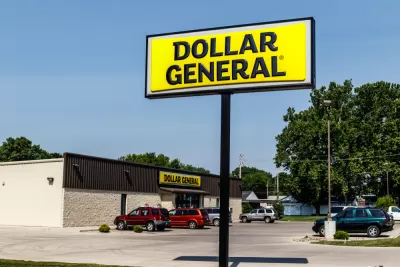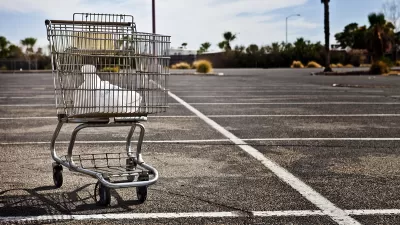Stores like Dollar General and Dollar Tree are putting a lot of grocery stores out of business, leaving communities with fewer places to buy fresh produce.

A growing portion of the United States lacks a grocery store, in part because their grocery stores can’t compete with Dollar stores. "These low-priced 'small-box' retailers, like Dollar General, offer little to no fresh food—yet they feed more Americans than either Trader Joe's or Whole Foods, and are gaining on the country’s largest food retailers,” Claire Kelloway reports for Civil Eats.
The Institute for Local Self-Reliance (ILSR) has published a study showing the way the story of dollar stores is tied to the long-running trend of consolidation in grocery stores. "The report makes the case that dollar stores undercut small rural grocers and hurt struggling urban neighborhoods by staving off full-service markets," Kelloway reports. Large chains like Kroger and Ahold-Delhaize buy up smaller chains and eliminate less profitable locations, leaving fewer local grocers. Those that remain struggling to compete. "These dominant chain stores have decimated independent retailers and divested from rural and low-income areas, as well as communities of color," Kelloway writes.
"Some, including dollar-store executives themselves, argue that a low-cost retailer seeking to go where no one else will benefits underserved communities," Kelloway reports. The ISLR counters that these stores have done a great deal to make the areas around them less desirable, by putting local grocery stores out of business.
FULL STORY: Dollar Stores Are Taking Over the Grocery Business, and It’s Bad News for Public Health and Local Economies

Alabama: Trump Terminates Settlements for Black Communities Harmed By Raw Sewage
Trump deemed the landmark civil rights agreement “illegal DEI and environmental justice policy.”

Study: Maui’s Plan to Convert Vacation Rentals to Long-Term Housing Could Cause Nearly $1 Billion Economic Loss
The plan would reduce visitor accommodation by 25% resulting in 1,900 jobs lost.

Why Should We Subsidize Public Transportation?
Many public transit agencies face financial stress due to rising costs, declining fare revenue, and declining subsidies. Transit advocates must provide a strong business case for increasing public transit funding.

Paris Bike Boom Leads to Steep Drop in Air Pollution
The French city’s air quality has improved dramatically in the past 20 years, coinciding with a growth in cycling.

Why Housing Costs More to Build in California Than in Texas
Hard costs like labor and materials combined with ‘soft’ costs such as permitting make building in the San Francisco Bay Area almost three times as costly as in Texas cities.

San Diego County Sees a Rise in Urban Coyotes
San Diego County experiences a rise in urban coyotes, as sightings become prevalent throughout its urban neighbourhoods and surrounding areas.
Urban Design for Planners 1: Software Tools
This six-course series explores essential urban design concepts using open source software and equips planners with the tools they need to participate fully in the urban design process.
Planning for Universal Design
Learn the tools for implementing Universal Design in planning regulations.
Smith Gee Studio
Alamo Area Metropolitan Planning Organization
City of Santa Clarita
Institute for Housing and Urban Development Studies (IHS)
City of Grandview
Harvard GSD Executive Education
Toledo-Lucas County Plan Commissions
Salt Lake City
NYU Wagner Graduate School of Public Service





























